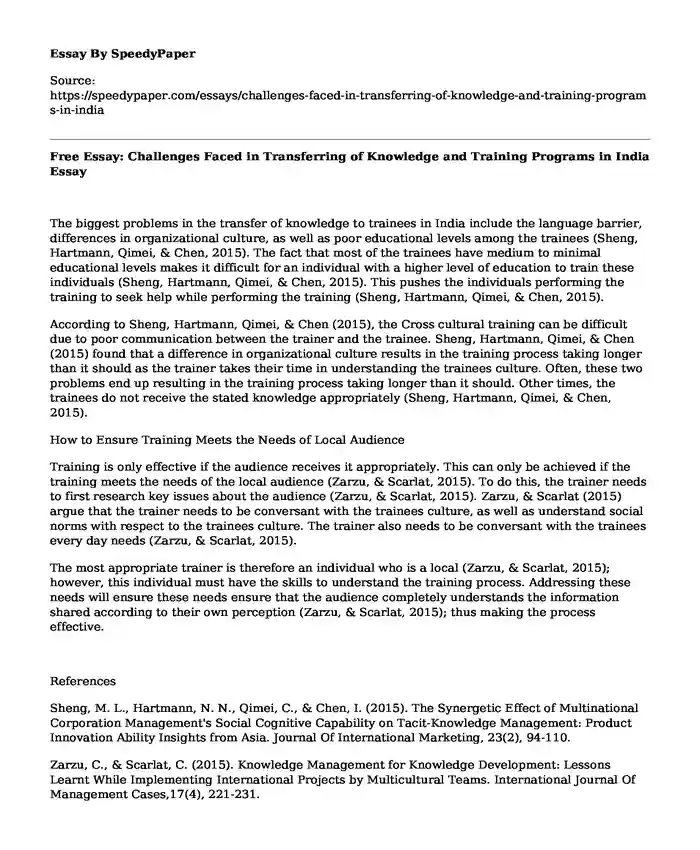
| Type of paper: | Essay |
| Categories: | Human resources Internship India |
| Pages: | 2 |
| Wordcount: | 422 words |
The biggest problems in the transfer of knowledge to trainees in India include the language barrier, differences in organizational culture, as well as poor educational levels among the trainees (Sheng, Hartmann, Qimei, & Chen, 2015). The fact that most of the trainees have medium to minimal educational levels makes it difficult for an individual with a higher level of education to train these individuals (Sheng, Hartmann, Qimei, & Chen, 2015). This pushes the individuals performing the training to seek help while performing the training (Sheng, Hartmann, Qimei, & Chen, 2015).
According to Sheng, Hartmann, Qimei, & Chen (2015), the Cross cultural training can be difficult due to poor communication between the trainer and the trainee. Sheng, Hartmann, Qimei, & Chen (2015) found that a difference in organizational culture results in the training process taking longer than it should as the trainer takes their time in understanding the trainees culture. Often, these two problems end up resulting in the training process taking longer than it should. Other times, the trainees do not receive the stated knowledge appropriately (Sheng, Hartmann, Qimei, & Chen, 2015).
How to Ensure Training Meets the Needs of Local Audience
Training is only effective if the audience receives it appropriately. This can only be achieved if the training meets the needs of the local audience (Zarzu, & Scarlat, 2015). To do this, the trainer needs to first research key issues about the audience (Zarzu, & Scarlat, 2015). Zarzu, & Scarlat (2015) argue that the trainer needs to be conversant with the trainees culture, as well as understand social norms with respect to the trainees culture. The trainer also needs to be conversant with the trainees every day needs (Zarzu, & Scarlat, 2015).
The most appropriate trainer is therefore an individual who is a local (Zarzu, & Scarlat, 2015); however, this individual must have the skills to understand the training process. Addressing these needs will ensure these needs ensure that the audience completely understands the information shared according to their own perception (Zarzu, & Scarlat, 2015); thus making the process effective.
References
Sheng, M. L., Hartmann, N. N., Qimei, C., & Chen, I. (2015). The Synergetic Effect of Multinational Corporation Management's Social Cognitive Capability on Tacit-Knowledge Management: Product Innovation Ability Insights from Asia. Journal Of International Marketing, 23(2), 94-110.
Zarzu, C., & Scarlat, C. (2015). Knowledge Management for Knowledge Development: Lessons Learnt While Implementing International Projects by Multicultural Teams. International Journal Of Management Cases,17(4), 221-231.
References
Gifford, M. (2013). Skepticism and elegance: problems for the abductivist reply to Cartesian skepticism. Philosophical Studies, 164(3), 685-704.
May, J. (2013). Skeptical hypotheses and moral skepticism. Canadian Journal Of Philosophy, 43(3), 341-359.
Cite this page
Free Essay: Challenges Faced in Transferring of Knowledge and Training Programs in India. (2019, Jun 24). Retrieved from https://speedypaper.net/essays/challenges-faced-in-transferring-of-knowledge-and-training-programs-in-india
Request Removal
If you are the original author of this essay and no longer wish to have it published on the SpeedyPaper website, please click below to request its removal:
- Free Essay on Disadvantages of Taking Online Classes
- Essay Example on Marketing Channels
- Geography Essay Sample: What Is the Difference Between an Ice Sheet and a Glacier?
- Essay Example. the Jealousy of Othello by William Shakespeare
- Cultural Diversity Through Literary Art - The Color Purple Essay Example
- Free Essay: Effects of Transformational Leadership on Nursing
- Free Essay. Women Abuse During the 19th Century in "Oliver Twist" and "Hard Times."
Popular categories




